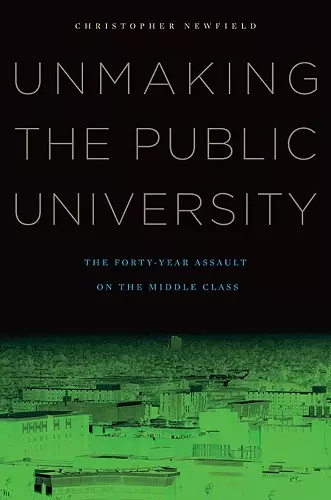Unmaking the Public University
The Forty-Year Assault on the Middle Class
Format:Paperback
Publisher:Harvard University Press
Published:30th May '11
Currently unavailable, and unfortunately no date known when it will be back

Newfield's argument is original, his evidence varied and rich, and his historical narrative coherent. He situates the university in its broadest social context, and shows that the 'culture wars,' far from being a sideshow, have in fact cleverly been fomented by conservatives to reshape the values of the university, the world-view of its graduates, and the economy which it significantly shapes and which shapes it. -- David L. Kirp, author of Shakespeare, Einstein, and the Bottom Line: The Marketing of Higher Education In a crowd of recent works dedicated to the changing university and its place in society, Newfield's rich, cogently argued and readable book stands out. This is that rare thing, truly critical history: a solidly researched book that is at once a fine example of the sort of scholarship that the American university still makes possible and a serious argument about the university. -- Anthony Grafton, author of The Footnote: A Curious History
Unmaking the Public University is the story of how conservatives have maligned and restructured public universities in a campaign to end public education’s democratizing influence on American society.
An essential American dream—equal access to higher education—was becoming a reality with the GI Bill and civil rights movements after World War II. But this vital American promise has been broken. Christopher Newfield argues that the financial and political crises of public universities are not the result of economic downturns or of ultimately valuable restructuring, but of a conservative campaign to end public education’s democratizing influence on American society. Unmaking the Public University is the story of how conservatives have maligned and restructured public universities, deceiving the public to serve their own ends. It is a deep and revealing analysis that is long overdue.
Newfield carefully describes how this campaign operated, using extensive research into public university archives. He launches the story with the expansive vision of an equitable and creative America that emerged from the post-war boom in college access, and traces the gradual emergence of the anti-egalitarian “corporate university,” practices that ranged from racial policies to research budgeting. Newfield shows that the culture wars have actually been an economic war that a conservative coalition in business, government, and academia have waged on that economically necessary but often independent group, the college-educated middle class. Newfield’s research exposes the crucial fact that the culture wars have functioned as a kind of neutron bomb, one that pulverizes the social and culture claims of college grads while leaving their technical expertise untouched. Unmaking the Public University incisively sets the record straight, describing a forty-year economic war waged on the college-educated public, and awakening us to a vision of social development shared by scientists and humanists alike.
Newfield's argument is original, his evidence varied and rich, and his historical narrative coherent. He situates the university in its broadest social context, and shows that the 'culture wars,' far from being a sideshow, have in fact cleverly been fomented by conservatives to reshape the values of the university, the world-view of its graduates, and the economy which it significantly shapes and which shapes it. -- David L. Kirp, author of Shakespeare, Einstein, and the Bottom Line: The Marketing of Higher Education
In a crowd of recent works dedicated to the changing university and its place in society, Newfield's rich, cogently argued and readable book stands out. This is that rare thing, truly critical history: a solidly researched book that is at once a fine example of the sort of scholarship that the American university still makes possible and a serious argument about the university. -- Anthony Grafton, author of The Footnote: A Curious History
It is not every day that you get a meticulous analysis of higher education budgetary mechanisms within the same covers as reflections on Robert Pirsig's Zen and the Art of Motorcycle Maintenance. And the sheer generosity of spirit that underlies Newfield's rather depressing reflections is deeply attractive. -- Alan Ryan * Times Higher Education Supplement *
It is not often that even a first-rate scholar and writer manages to delve so deeply into a core problem of his society and time as to come out with an understanding of it that is so complete, so profound--indeed revelatory--as to illuminate the public muddled mind and open the way to recovery. This is what Christopher Newfield has achieved in his book, Unmaking the Public University. The problem in focus is the decline of the American public university...Newfield's thesis is that this decline has been orchestrated by the American Right who, in the 1970s, got frightened by the democratizing influence higher public education was exerting on the American society. Conservative elites felt threatened by the post-World War II rise of a college-educated economic majority--a mass middle class--and started an assault against it. The Right did not dare to openly attack the economic position of the middle class. Instead, they waged culture wars against it. -- Emilia Ilieva * Daily Nation *
Seriously researched, rich in data...[Unmaking the Public University] excavates a world of ugly facts and unsatisfactory practices that has the gritty look and feel of reality--a reality that has little to do with the glossy hype of world university ratings. -- Anthony Grafton * New York Review of Books *
- Nominated for Pulitzer Prizes 2009
- Nominated for Merle Curti Award 2009
- Nominated for Lawrence W. Levine Award 2009
- Nominated for Jacques Barzun Prize 2008
- Nominated for J. Anthony Lukas Book Prize 2009
ISBN: 9780674060364
Dimensions: unknown
Weight: unknown
408 pages